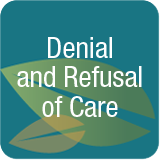Denial is Fear in Disguise
By Pamela D. Wilson, CSA, MS, BS/BA, CG
The mother of a client was diagnosed with cancer about a month ago. There are four children, two sisters and two brothers, in the family who rallied to provide care for the mother in the way of day to day activities such as housekeeping, meal prep, errands, laundry etc. After about a month, the children decided to seek outside assistance because they realized that their mother’s health will not improve and it is not possible or practical to keep up the schedules of providing care, working, and caring for their own families.
In a meeting with the entire family, the mother kept stating, “I can’t decide to do anything (receive outside care) until I know what is going on.” The daughter most responsible for her mother’s medical needs went into a long discussion of what the physicians had told her mother about the condition and the reality that her mother is dying. The son most responsible for finances reassured his mother that there was no issue in paying for care and that he and his siblings want her to have more support than they are able to provide.
 In spite of the lengthy discussion, the mother was still resistant to the idea of accepting help and readily denied making her children feel guilty about not responding immediately to her beck and call even when she called them at work multiple times each day. One suggestion to the family was to make an appointment for their mother with a psychologist who might be able to discuss feelings of grief, anger and loss related to the terminal diagnosis. Denial about an illness usually results in family distress and difficulties.
In spite of the lengthy discussion, the mother was still resistant to the idea of accepting help and readily denied making her children feel guilty about not responding immediately to her beck and call even when she called them at work multiple times each day. One suggestion to the family was to make an appointment for their mother with a psychologist who might be able to discuss feelings of grief, anger and loss related to the terminal diagnosis. Denial about an illness usually results in family distress and difficulties.
In this case, the mother’s children had already moved through their stage of denial and grief by accepting the diagnosis and attempting to make practical plans for the care of their mother. The next challenge was to allow their mother to gain acceptance so that she can accept and receive the assistance she truly needs to enhance the quality of her life during this period.
The children were able to move past their guilt about not being able to be the sole care providers. We as advocates were able to hire and supervise an in home caregiving agency to be with their mother 24 hours a day and to ensure that their mother received the care that she needed up until the time of her death.
Many families have great difficulty understanding care needs until they are in the exact role of caregiver. I work with many families where one child is the sole caregiver. This caregiver becomes exhausted. Other children in the family fail to provide emotional or financial support or even support the idea of a paid caregiver. That is until the phone calls and cries for help begin coming directly to them; then they realize what their sole sister or brother experienced as a caregiver. The reality of caregiving is that no matter how much we love a parent, the activity is work. Work that can easily be performed by a paid caregiver so that family is able to preserve and foster loving relationships.
© 2012, 2013 Pamela D. Wilson, All Rights Reserved.
Return to Denial and Refusal of Care PageReturn to All Category Page




